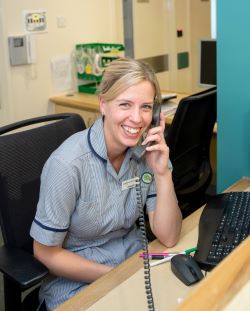World Mental Health Day
Posted 10th October 2019
Each year in the UK, approximately 1 in 3 people with cancer will experience a mental health problem before, during or after treatment. On World Mental Health Day we’re turning our attention to how we support our patients and staff here at The Clatterbridge Cancer Centre who may be going through difficult and challenging times.

Our Clinical Nurse Specialists are here to help our patients in every way both, psychologically and physically and are supported by our Consultant Psychiatrists, Dr Jane Younger and Dr Geraldine Swift, as well as counsellor Ann-Marie Orford.
“Patients can be referred to our team at different stages of their journey,” explains Dr Jane Younger. “Sometimes they are referred a year or two after treatment when they’ve come to back to the Centre for a follow up appointment and have said ‘actually I’m still struggling with this’ or sometimes they get referred to us right at the beginning of treatment when they’re finding it really tough.”
However, the majority of patients the team see are those who have finished treatment and are coming to terms with what they have been through. As Dr Younger explains; “Sometimes it’s only after treatment that patients start thinking about they’ve been through and trying to figure it out.”
As part of the service The Clatterbridge Cancer Centre provides, patients can be referred to two different group courses ran by Ann-Marie, the HOPE Course and an eight week Mindfulness course. The HOPE Course (which stands for help overcoming problems effectively), is designed for patients who have been treated with curative intent. It is run within the Wirral community alongside a Patient Expert who has been through treatment at The Clatterbridge Cancer Centre too and can empathise with what other patients may be going through. Whilst the Mindfulness course, which is run in association with Maggie’s Merseyside, has been taken by Ann-Marie and made specific to patients with cancer.
“Everybody’s different; that’s one of the wonderful things about my job,” Dr Younger comments. “It’s really lovely to hear people’s stories and understand what it’s been like for them.”
Dr Younger and Dr Swift also support staff within the wider Trust who may be dealing with challenging situations, working closely with them to offer advice on how to manage complex situations. They also offer Clinical Supervision Groups too so staff are able to talk to them about their jobs and how to manage the emotional impact of their role so in turn they’re more likely to ask the difficult questions.
“We see our job in direct patient care but also supporting other members of the team.”
